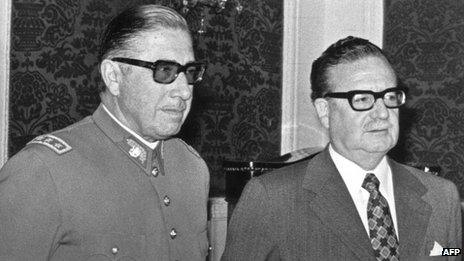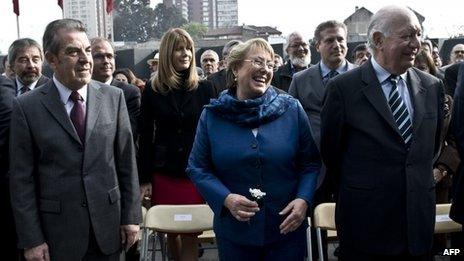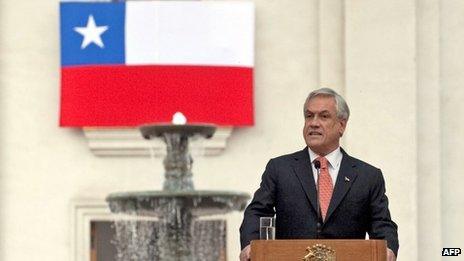Chile opposition leader Bachelet calls for Pinochet probe
- Published

Gen Pinochet (left) was appointed head of the army by President Salvador Allende (right) shortly before the coup
Chilean opposition leader Michelle Bachelet has called for a full investigation on the human rights abuses committed during Gen Pinochet's rule.
She led a ceremony to commemorate the 40th anniversary of the coup that brought the general to power.
She demanded an end to impunity and said Chileans had the right to find out what happened to the victims.
The opposition has boycotted an official ceremony to mark the coup.
At the ceremony, centre-right President Sebastian Pinera criticised the "violent coup that started a 17-year period of military rule".
But he said it was "the predictable outcome" after "repeated violations of the rule of law" under the government of socialist President Salvador Allende.
He denounced the violations committed during the period and said: "Many of us could have done a great deal more to safeguard the respect of human rights."
The event, at the presidential palace in Santiago, was attended by Ms Bachelet's rival in November's presidential election, Evelyn Matthei.
Tortured and exiled
During the opposition ceremony held earlier at the capital's Museum of Memory and Human Rights, Ms Bachelet dismissed the view that Chile was on the verge of a civil war in 1973.

Former presidents Eduardo Frei (left), Michelle Bachelet (centre) and Ricardo Lagos (right) attended the opposition ceremony
"It is fair to say there was a lack of dialogue and a polarisation of the politics then. But it is unfair to say that the the military coup was inevitable," she said.
She said "painful wounds" were reopened every time Chile looked into its past, but said the aim was not to victimise anyone, but "to get to know the truth."
More than 3,000 people are estimated to have been killed during Gen Augusto Pinochet's government, which came into power on 11 September 1973.
Mr Allende committed suicide inside the presidential palace - Palacio de la Moneda - after it was encircled by troops and bombed by Chilean air force planes.
According to official figures, some 40,000 people were victims of human rights abuses, including Ms Bachelet and her mother, who were tortured before going into exile.
She returned to Chile after the end of Gen Pinochet's rule and was elected the country's first woman president.

Mr Pinera said nothing could justify torture and killings carried out during military rule
The BBC's Gideon Long in Santiago says 40 years on, Chile is still split over the events that preceded the coup and General Pinochet's legacy.
These divisions are evident in the campaign to succeed Mr Pinera.
Chileans go to the polls on 17 November to choose between Ms Bachelet and Ms Matthei, the daughters of two generals who were good friends and neighbours until the 1973 coup.
Gen Alberto Bachelet, who remained loyal to Mr Allende, was arrested, tortured and died in detention. Gen Fernando Matthei became a senior member of Gen Pinochet's regime.
- Published9 September 2013
- Published6 September 2013
- Published6 August 2013